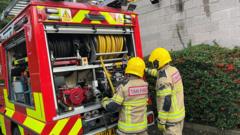What Happened When Settlers Attacked a Palestinian Farm in the West Bank?

Understanding the Current State of Conflict in the West Bank
The ongoing conflict in the West Bank is a complex and deeply anchored issue that has been marked by violent confrontations, land disputes, and the struggle for identity. The narrative surrounding the plight of Palestinian farmers, like Brahim Hamaiel, illustrates a broader theme of resistance against systemic oppression. The destruction of olive trees, a symbol of Palestinian heritage, serves as a poignant reminder of the lengths to which settlers will go to assert their dominance. As tensions escalate, understanding the intricacies of this conflict becomes crucial for anyone seeking insight into the region’s turmoil.
The Olive Tree: A Symbol of Palestinian Identity
Olive trees are not merely agricultural assets for Palestinians; they represent their connection to the land and heritage. For generations, families like the Hamaiels have cultivated these trees, sustaining their livelihoods and cultural identity. The recent attacks on these trees are not just acts of vandalism; they are calculated efforts to erase a way of life and disrupt the fabric of Palestinian society. The olive tree is a potent symbol of resilience and continuity, and its destruction is perceived as an assault on Palestinian identity itself.
Recent Escalations: The Role of Settlers
The frequency of settler violence has surged alarmingly, particularly since the escalation of hostilities following the Hamas attacks on Israel. Reports from organizations monitoring the situation indicate a sharp increase in the number of illegal outposts and aggressive settler behavior. In less than two years, the landscape has changed dramatically, with settlers laying claim to land that has historically belonged to Palestinian families. This expansion is often met with violence, resulting in not only physical harm but also psychological trauma for local residents.
The Impact of Israeli Policies
Israeli policies play a pivotal role in shaping the dynamics of the conflict. The government’s support for settlements has emboldened extremist settlers, allowing them to act with impunity. The lack of accountability for violent actions against Palestinians fosters an environment where fear permeates everyday life. As Brahim Hamaiel articulated, the sentiment of fear exists alongside a profound yearning to remain connected to one’s roots. This juxtaposition highlights the struggle faced by many Palestinians: the desire to resist oppression while grappling with the realities of violence and intimidation.
Community Responses and Solidarity
In the face of aggression, Palestinian communities have demonstrated remarkable resilience and solidarity. When attacks occur, neighbors rally together, armed with whatever means they have to defend their homes and livelihoods. The sense of unity among Palestinians during these crises is palpable and speaks to a collective identity forged through shared experiences of loss and resistance. The willingness to confront aggressors, despite the risks involved, underscores the deep-rooted commitment to protecting their heritage and way of life.
The Role of International Observers
International observers play a crucial role in documenting the events on the ground, often serving as a counterbalance to the narratives presented by both sides of the conflict. Organizations like Peace Now provide essential data regarding settlement expansion and violence, helping to shed light on the ongoing struggle faced by Palestinians. However, their presence can also be met with hostility, as seen when volunteers attempting to assist during confrontations are obstructed by the Israeli army. The complexity of the situation necessitates an unbiased approach to reporting, which remains a challenge in such a charged environment.
Humanitarian Crisis and International Response
The humanitarian situation in the West Bank continues to deteriorate as violence escalates. Reports from the UN Office for Humanitarian Affairs paint a grim picture, with numerous incidents of violence leading to casualties and displacement. The ongoing conflict has created a cycle of retaliation and suffering, exacerbating the living conditions for Palestinians. International responses to this crisis have been varied, with some advocating for increased humanitarian aid while others call for a reevaluation of policies that perpetuate the cycle of violence.
The Importance of Dialogue and Understanding
In any conflict, dialogue is essential for fostering understanding and reconciliation. The narratives of individuals like Brahim Hamaiel and Rifa Said Hamail highlight the human cost of political decisions and the need for empathy. Building bridges between communities and fostering conversations about coexistence is crucial for paving the way toward a lasting resolution. While the path to peace may be fraught with challenges, it is essential to acknowledge the shared humanity that exists on both sides of the divide.
Conclusion: The Path Forward
The story of Brahim Hamaiel is just one of many that illustrate the ongoing struggles in the West Bank. As the situation continues to evolve, it is imperative for the international community to remain engaged and informed. The complexities of this conflict demand a nuanced understanding and a commitment to fostering peace. The resilience of the Palestinian people in the face of adversity serves as a powerful testament to their enduring spirit and connection to the land.
FAQs
What are the main causes of the conflict in the West Bank?
The conflict is rooted in historical disputes over land, national identity, and competing claims to sovereignty. Factors include Israeli settlement expansion, military occupation, and Palestinian aspirations for statehood.
How has settler violence impacted Palestinian communities?
Settler violence has led to physical harm, psychological trauma, and the destruction of property, significantly impacting the livelihoods and well-being of Palestinian communities.
What role does the international community play in the conflict?
The international community can advocate for human rights, provide humanitarian assistance, and support diplomatic efforts aimed at achieving a peaceful resolution to the conflict.
How can dialogue contribute to resolving the conflict?
Dialogue fosters understanding between communities, encouraging empathy and collaboration. It is essential for building trust and finding common ground necessary for a sustainable peace.
The ongoing struggle in the West Bank presents a myriad of challenges, but it also highlights the resilience and strength of the Palestinian people. As we reflect on these stories, we must consider our role in advocating for peace and justice. How can we contribute to a future that respects the rights and dignity of all people in the region? #WestBank #PalestinianRights #ConflictResolution
```Published: 2025-08-18 10:00:26 | Category: world



